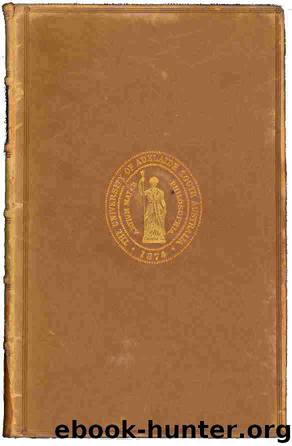The Rights of Man by Paine Thomas 1737-1809

Author:Paine, Thomas, 1737-1809
Language: eng
Format: epub
Tags: Literature
Publisher: The University of Adelaide Library
Front Table of Contents Next
http://ebooks.adelaide.edu.au/p/paine/thomas/p147r/preface3.html
Last updated Tuesday, November 20, 2012 at 22:25
The Rights of Man, by Thomas Paine
Introduction
What Archimedes said of the mechanical powers, may be applied to Reason and Liberty. "Had we," said he, "a place to stand upon, we might raise the world."
The revolution of America presented in politics what was only theory in mechanics. So deeply rooted were all the governments of the old world, and so effectually had the tyranny and the antiquity of habit established itself over the mind, that no beginning could be made in Asia, Africa, or Europe, to reform the political condition of man. Freedom had been hunted round the globe; reason was considered as rebellion; and the slavery of fear had made men afraid to think.
But such is the irresistible nature of truth, that all it asks, and all it wants, is the liberty of appearing. The sun needs no inscription to distinguish him from darkness; and no sooner did the American governments display themselves to the world, than despotism felt a shock and man began to contemplate redress.
The independence of America, considered merely as a separation from England, would have been a matter but of little importance, had it not been accompanied by a revolution in the principles and practice of governments. She made a stand, not for herself only, but for the world, and looked beyond the advantages herself could receive. Even the Hessian, though hired to fight against her, may live to bless his defeat; and England, condemning the viciousness of its government, rejoice in its miscarriage.
As America was the only spot in the political world where the principle of universal reformation could begin, so also was it the best in the natural world. An assemblage of circumstances conspired, not only to give birth, but to add gigantic maturity to its principles. The scene which that country presents to the eye of a spectator, has something in it which generates and encourages great ideas. Nature appears to him in magnitude. The mighty objects he beholds, act upon his mind by enlarging it, and he partakes of the greatness he contemplates. Its first settlers were emigrants from different European nations, and of diversified professions of religion, retiring from the governmental persecutions of the old world, and meeting in the new, not as enemies, but as brothers. The wants which necessarily accompany the cultivation of a wilderness produced among them a state of society, which countries long harassed by the quarrels and intrigues of governments, had neglected to cherish. In such a situation man becomes what he ought. He sees his species, not with the inhuman idea of a natural enemy, but as kindred; and the example shows to the artificial world, that man must go back to Nature for information.
From the rapid progress which America makes in every species of improvement, it is rational to conclude that, if the governments of Asia, Africa, and Europe had begun on a principle similar to that of America, or had not been
Download
This site does not store any files on its server. We only index and link to content provided by other sites. Please contact the content providers to delete copyright contents if any and email us, we'll remove relevant links or contents immediately.
| Anthropology | Archaeology |
| Philosophy | Politics & Government |
| Social Sciences | Sociology |
| Women's Studies |
The Secret History by Donna Tartt(19051)
The Social Justice Warrior Handbook by Lisa De Pasquale(12187)
Thirteen Reasons Why by Jay Asher(8893)
This Is How You Lose Her by Junot Diaz(6877)
Weapons of Math Destruction by Cathy O'Neil(6264)
Zero to One by Peter Thiel(5786)
Beartown by Fredrik Backman(5737)
The Myth of the Strong Leader by Archie Brown(5498)
The Fire Next Time by James Baldwin(5431)
How Democracies Die by Steven Levitsky & Daniel Ziblatt(5213)
Promise Me, Dad by Joe Biden(5141)
Stone's Rules by Roger Stone(5081)
A Higher Loyalty: Truth, Lies, and Leadership by James Comey(4952)
100 Deadly Skills by Clint Emerson(4920)
Rise and Kill First by Ronen Bergman(4779)
Secrecy World by Jake Bernstein(4740)
The David Icke Guide to the Global Conspiracy (and how to end it) by David Icke(4701)
The Farm by Tom Rob Smith(4502)
The Doomsday Machine by Daniel Ellsberg(4484)
